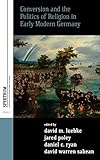Conversion and the Politics of Religion in Early Modern Germany / ed. by David M. Luebke, David Warren Sabean, Daniel C. Ryan, Jared Poley.
Material type: TextSeries: Spektrum: Publications of the German Studies Association ; 3Publisher: New York ; Oxford : Berghahn Books, [2012]Copyright date: ©2012Description: 1 online resource (216 p.)Content type:
TextSeries: Spektrum: Publications of the German Studies Association ; 3Publisher: New York ; Oxford : Berghahn Books, [2012]Copyright date: ©2012Description: 1 online resource (216 p.)Content type: - 9780857453754
- 9780857453761
- 248.2/409 23
- BT780 .C573 2012
- BT780 .C573 2012
- online - DeGruyter
| Item type | Current library | Call number | URL | Status | Notes | Barcode | |
|---|---|---|---|---|---|---|---|
 eBook
eBook
|
Biblioteca "Angelicum" Pont. Univ. S.Tommaso d'Aquino Nuvola online | online - DeGruyter (Browse shelf(Opens below)) | Online access | Not for loan (Accesso limitato) | Accesso per gli utenti autorizzati / Access for authorized users | (dgr)9780857453761 |
Frontmatter -- CONTENTS -- Preface -- Introduction. The Politics of Conversion in Early Modern Germany -- Chapter One. Paths of Salvation and Boundaries of Belief: Spatial Discourse and the Meanings of Conversion in Early Modern Germany -- Chapter Two. Conversion Concepts in Early Modern Germany: Protestant and Catholic -- Chapter Three. Turning Dutch? Conversion in Early Modern Weselz -- Chapter Four. The Right to Be Catholic—the Right to Be Protestant? Perspectives on Conversion before and after the Peace of Westphalia -- Chapter Five. Conversion and Diplomacy in Absolutist Northern Europe -- Chapter Six. Irenicism and the Challenges of Conversion in the Early Eighteenth Century -- Chapter Seven. Mish-Mash with the Enemy: Identity, Politics, Power, and the Threat of Forced Conversion in Frederick William I’s Prussia -- Chapter Eight. Pietist Conversion Narratives and Confessional Identity -- Chapter Nine. Conversion and Sarcasm in the Autobiography of Johann Christian Edelmann -- Afterword -- Bibliography -- Notes on the Contributors -- Index
restricted access online access with authorization star
http://purl.org/coar/access_right/c_16ec
The Protestant and Catholic Reformations thrust the nature of conversion into the center of debate and politicking over religion as authorities and subjects imbued religious confession with novel meanings during the early modern era. The volume offers insights into the historicity of the very concept of “conversion.” One widely accepted modern notion of the phenomenon simply expresses denominational change. Yet this concept had no bearing at the outset of the Reformation. Instead, a variety of processes, such as the consolidation of territories along confessional lines, attempts to ensure civic concord, and diplomatic quarrels helped to usher in new ideas about the nature of religious boundaries and, therefore, conversion. However conceptualized, religious change— conversion—had deep social and political implications for early modern German states and societies.
Mode of access: Internet via World Wide Web.
In English.
Description based on online resource; title from PDF title page (publisher's Web site, viewed 25. Jun 2024)


